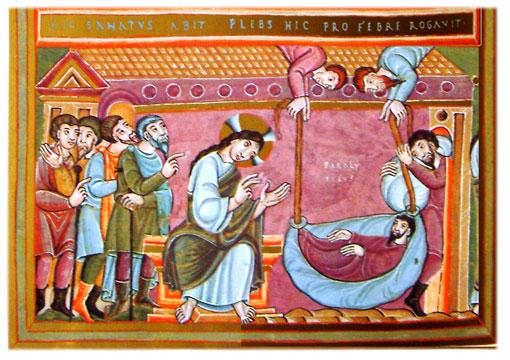3rd Thursday of the Year (30 Jan 2020)
Homily of Fr. Paul Panaretos, S.J., Full Spiritual Exercises
Uncontrollable
Hearers and watchers of narrative and drama are more aware than the actors in them. Our more accurate knowledge is called irony; Mark’s gospel drips with irony from its opening words: the beginning of the gospel of Jesus Christ, the Son of God.1 We know who God knows: Christ Jesus is God’s son. We know who the spirits and the cosmic forces know: Jesus, the Holy One of God. We know who Jesus’ opponents reject, and we know Jesus’ identity before the disciples grasp it.
_-_James_Tissot_-_overall.jpg) From the start the gospel’s irony revolves around Jesus: he is the key to interpreting his announcement: the time is fulfilled and God’s reign is at hand2; Jesus embodies his announcement. Though address-ed to all the earth it is not earth-bound: it is God’s costly action for the world; hostile spirits and cosmic forces oppose him. The first spirit in the drama was vocal: What do you have to do with us, Jesus of Nazareth? Have you come to destroy us? I know who you are—the Holy One of God!3 In his presence others shrieked, You are the Son of God.4
From the start the gospel’s irony revolves around Jesus: he is the key to interpreting his announcement: the time is fulfilled and God’s reign is at hand2; Jesus embodies his announcement. Though address-ed to all the earth it is not earth-bound: it is God’s costly action for the world; hostile spirits and cosmic forces oppose him. The first spirit in the drama was vocal: What do you have to do with us, Jesus of Nazareth? Have you come to destroy us? I know who you are—the Holy One of God!3 In his presence others shrieked, You are the Son of God.4
Our more accurate knowledge can be hard to take. It isn’t easy to sympathize with the disciples as they falter in coming to know Jesus; our hesitations to know Jesus allow us to do it. When we curb our desire to shake sense into them, we take heart: although they were slow to recognize and know Jesus, the disciples perse-vered! as did Jesus, which is easy to forget. Through his relationship with his disciples Jesus teaches us. How? Jesus urges, Take no excessive pride in self and achievements. A smug attitude closes us to Jesus and to the mystery he is, the mystery his Spirit manifests in the particulars of our lives, locations and times. Though they did not understand Jesus, one cannot say the disciples were smug: they followed Jesus though quite unaware. My teacher enlightened me and others that Jesus
seems to be saying, “if [we] think [we] understand the mystery of the kingdom and even control it, watch out; it remains alive and [awesome] beyond [our] comprehension. If [we] think disciple-ship consists in power because of the presence of God, beware; [we] are called to follow the one who suffered and died. [Our] discipleship is defined by his messiahship, that is, in terms of [obedient listening] and service.”5
Opposition to Jesus was violent; threats to kill him emerged early. The violent opposition forced Jesus to speak in parables. While parables confounded6 opponents we can do what they would not: apply them to ourselves. Do we receive the word as gift and help it take root in us? Do we welcome the light Jesus is and offers? When we welcome Jesus, do we share him?
 Signals that we are face to face with mystery punctuate the parables we apply to ourselves: Listen! Whoever has ears to hear…listen! Anyone who has ears to hear ought to listen! Take care how you listen7 Earlier Mediterranean prophets used such phrases to alert listeners to God’s ways that we can never domes-ticate. Jesus drew on Isaiah: see but not perceive…listen but not understand.
Signals that we are face to face with mystery punctuate the parables we apply to ourselves: Listen! Whoever has ears to hear…listen! Anyone who has ears to hear ought to listen! Take care how you listen7 Earlier Mediterranean prophets used such phrases to alert listeners to God’s ways that we can never domes-ticate. Jesus drew on Isaiah: see but not perceive…listen but not understand.
We can only wait on the divine mystery—ever a human challenge. Whom do we await? Our benevolent God as Jesus revealed. Mystic Julian of Norwich in the 14th C experienced the benevolent God as “courteous Lord.” The descriptor is rich: affable; gentle; considerate; thoughtful; chivalrous—loyal, honourable, strong. God lavishes for our benefit “princely friendship” in every circumstance to support and restore us.8
Have we gracious courage to welcome such divine qualities? Are we free to move beyond any shock that God is courteous? is humble? benevolently befriends? is human? Look to Jesus, and take care how you look? That is, ask for the grace you need and wait on it.
___________
- Mark 1.1.
- Mark 1.15.
- Mark 1.24.
- Mark 3.11.
- Luke Timothy Johnson, The Writings of the New Testament (Kindle Locations 2621-2624).
- Mark 4.11, part of Mark 4.1-20, yesterday’s gospel selection.
- Mark 4.3, 8, 23, 24.
- Her Showings, chapter 39. “Princely friendship” appears in the translation in Enfolded in Love: Daily Readings with Julian of Norwich.
___________
Wiki-images: Jesus teaches by the sea PD-US; Julian of Norwich by Antiquary CC BY-SA 4.0
.jpg)
_-_James_Tissot_-_overall.jpg)
_(14596373248).jpg)


